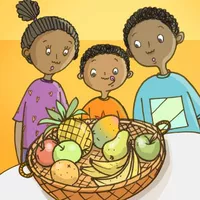Castigo
Bestrafung
Punishment
罰則について
처벌
Bausmė
Straf
Kara
Punição
Наказание
Straff
Cezalandırma
Покарання
惩罚
Un día, mamá trajo mucha fruta.
Eines Tages brachte Mama viel Obst.
One day, mom brought a lot of fruit.
Un giorno la mamma portò un sacco di frutta.
ある日、お母さんがたくさんの果物を持ってきました。
“¿Cuándo podemos comer fruta?” le preguntamos.
Wann können wir Obst essen, fragen wir sie
"When can we eat fruit?" we asked.
"Quando possiamo mangiare la frutta?", abbiamo chiesto.
"いつからフルーツが食べられるの?"と私たちは聞きました。
“Esta noche comeremos fruta,” dice mamá.
Heute Abend werden wir Obst essen, sagt Mama.
“Tonight we will eat fruit,” Mom says.
"Stasera mangiamo la frutta", dice la mamma.
"今夜はフルーツを食べよう "とママは言います。
Mi hermano Rahim es glotón.
Mein Bruder Rahim ist ein Vielfraß.
My brother Rahim is a glutton.
Mio fratello Rahim è un mangione.
弟のラヒムは大食漢です。
Prueba toda la fruta.
Er probiert alle Früchte.
Try all the fruit.
Assaggiare tutta la frutta.
すべてのフルーツを味わう。
Come mucha.
Er isst viel
eat a lot.
Mangiare molto.
たくさん食べてください。
“¡Mira lo que hizo Rahim!” grita mi hermano pequeño.
"Schau, was Rahim getan hat!" schreit mein kleiner Bruder.
"Look what Rahim did!" yells my little brother.
"Guarda cosa ha fatto Rahim!", grida il mio fratellino.
"ラヒムがやったことを見ろ!"と弟は叫ぶ。
“Rahim es travieso y egoísta,” le respondo.
„Rahim ist schelmisch und egoistisch“, erwidere ich.
“Rahim is mischievous and selfish,” I reply.
"Rahim è cattivo ed egoista", rispondo.
"ラヒムはやんちゃでわがまま "と答えます。
Mamá se enoja con Rahim.
Mama wird sauer auf Rahim.
Mom gets mad at Rahim.
La mamma si arrabbia con Rahim.
ママはラヒムに怒る。
Nosotros también nos enojamos con Rahim.
Wir sind auch wütend auf Rahim.
We were also angry with Rahim.
Eravamo anche arrabbiati con Rahim.
私たちもラヒムに怒っていました。
Pero Rahim no está arrepentido.
Aber Rahim tut es nicht leid.
But Rahim is not sorry.
Ma Rahim non si è pentito.
しかし、ラヒムは反省していない。
“¿No vas a castigar a Rahim?” pregunta mi hermano pequeño.
"Wirst du Rahim nicht bestrafen?" fragt mein kleiner Bruder.
"Aren't you going to punish Rahim?" asks my little brother.
"Non vuoi punire Rahim?", chiede il mio fratellino.
"ラヒムを罰しないの?"と弟が聞く。
“Rahim, pronto te arrepentirás,” le advierte mamá.
„Rahim, du wirst es bald bereuen“, warnt Mama ihn.
“Rahim, you will soon regret it,” Mom warns him.
"Rahim, te ne pentirai presto", avverte la madre.
「ラヒム、すぐに後悔するわよ」と、彼の母親は警告している。
Rahim empieza a sentir náuseas.
Rahim wird übel.
Rahim begins to feel nauseous.
Rahim inizia ad avere la nausea.
ラヒムは吐き気を催し始める。
“Me duele mucho el estómago,” susurra Rahim.
„Mein Bauch tut sehr weh“, flüstert Rahim.
“My stomach hurts a lot,” Rahim whispers.
"Mi fa molto male lo stomaco", sussurra Rahim.
"お腹がすごく痛い "とラヒムは囁く。
Mamá sabía que esto pasaría.
Mama wusste, dass das passieren würde.
Mom knew this would happen.
La mamma sapeva che sarebbe successo.
ママはこうなることをわかっていた。
¡La fruta está castigando a Rahim!
Die Frucht bestraft Rahim!
The fruit is punishing Rahim!
Il frutto sta punendo Rahim!
果実はラヒムを罰している!
Más tarde, Rahim nos pide disculpas.
Später entschuldigt sich Rahim bei uns.
Later, Rahim apologizes to us.
In seguito, Rahim si scusa.
その後、ラヒムは謝罪する。
“No volveré a ser tan glotón,” promete.
„Ich werde nicht wieder so gefräßig sein“, verspricht er.
“I won't be so gluttonous again,” he promises.
"Non sarò più così goloso", promette.
Y todos aceptamos su promesa.
Und wir alle nehmen sein Versprechen an.
And we all accept his promise.
E tutti abbiamo accettato la sua promessa.

